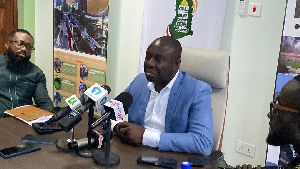The Minister of State in charge of Special Initiatives, Emmanuel Kwadwo Agyekum, has outlined the National Democratic Congress (NDC) government’s comprehensive labour-export strategy aimed at reducing unemployment, boosting foreign exchange inflows and improving the skills base of Ghana’s workforce.
Ghana’s Non-Traditional Exports hit $2.25 billion in 2024 – GFZA boss
Speaking during a media engagement on November 17, 2025, the minister said the initiative rooted in the vision of President John Dramani Mahama is designed to tackle three major challenges: high unemployment, low forex inflows and limited skills development.
According to him, the programme is not limited to any specific sector but adopts a holistic, nationwide approach.
Agyekum said the initiative targets both skilled and unskilled labour across several industries.
Private sector central to-economic growth -Free-Zones Authority Deputy-CEO
According to him, skilled categories include doctors, nurses, carpenters, masons, steel benders, lab technicians, pharmacists, welders, fabricators, bricklayers and chefs.
He added that non-skilled workers such as general labourers, helpers, seasonal farm workers, and individuals who undergo basic six-week marine training to work on cruise or cargo ships will also benefit.
He emphasised the growing global demand for labour, particularly in the marine, construction and hospitality industries.
Justifying the projected revenue, the minister cited global examples where labour export has significantly boosted national economies.
He referenced the Philippines, which reportedly earns over $130 billion annually from labour export and India, which made more than $126 billion in 2023 and over $130 billion in 2024 through similar policies.
Countries such as Egypt and Morocco also earn billions with Egypt receiving over $35 billion and Morocco more than $11 billion from labour remittances.
“These figures are not far-fetched, with proper structuring, Ghana can also generate between $10 to $20 billion from labour export,” he said.
The minister disclosed that seven ministries have been tasked to collaborate in structuring the initiative, given its cross-sectoral nature. These include the ministries of Education, Health, Works and Housing, Agriculture, Fisheries and others.
“We are not looking at nurses alone, we are looking at teachers, carpenters, masons, welders, farmers, everyone. It is a coordinated effort.”
Agyekum emphasised that the safety and rights of Ghanaian workers abroad are paramount. As part of the framework, all Ghanaian embassies will have dedicated desk officers to handle labour-related concerns.
Additionally, Ghana is signing Memoranda of Understanding (MoUs) with partner countries to ensure the welfare and protection of exported labour.
He explained that individuals interested in opportunities will be required to register into a national database. Once vacancies or foreign requests arise, qualified applicants will be contacted based on their skill set.
Malik Basintale breaks silence on stroke rumours



